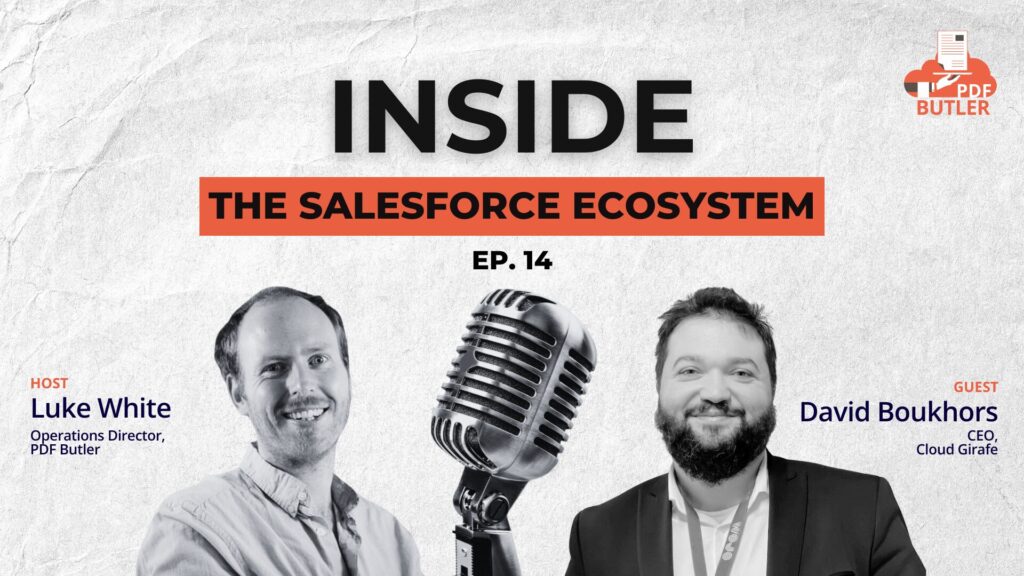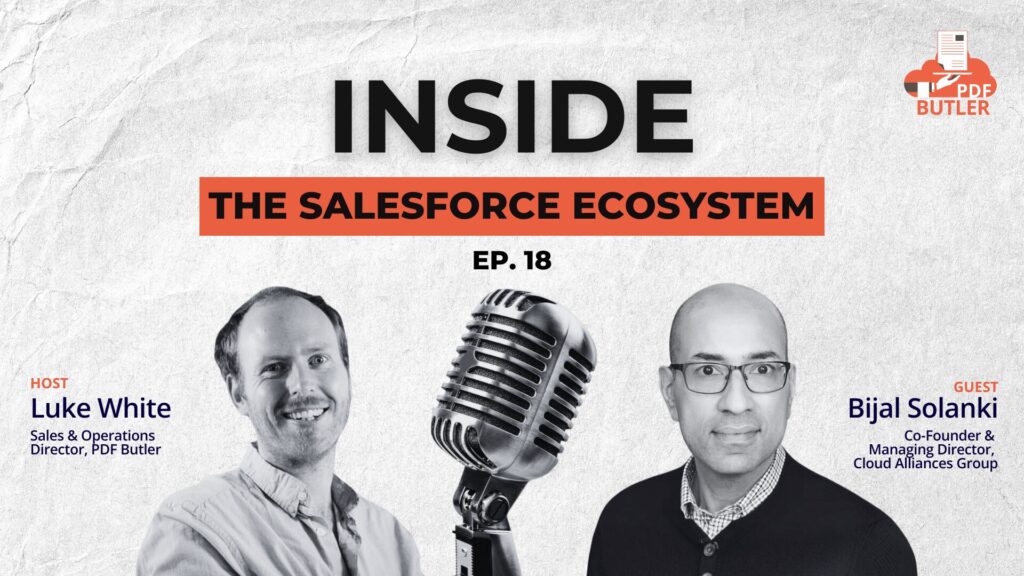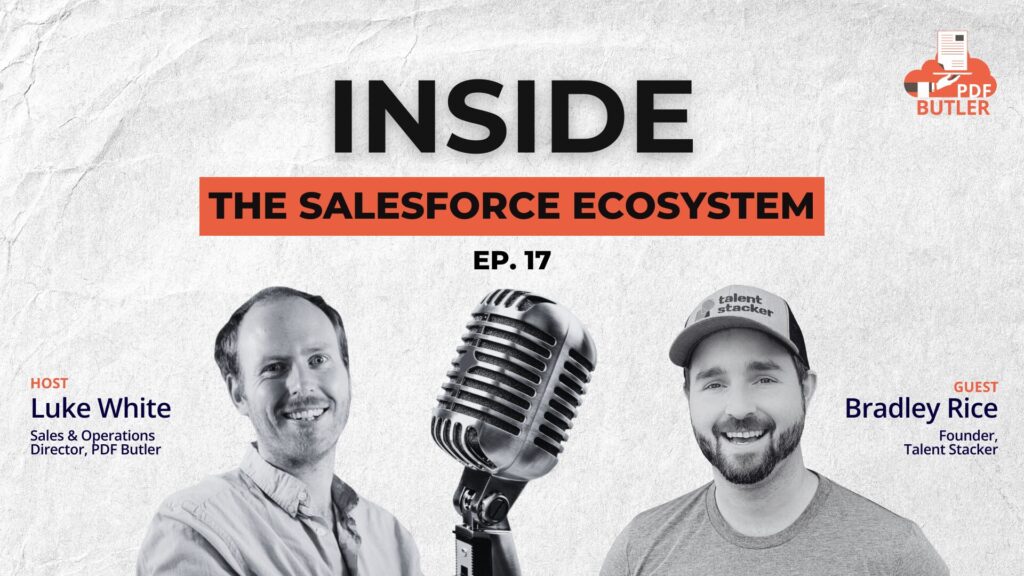Welcome to Inside the Salesforce Ecosystem, where we dive deep with the leaders, experts, and innovators shaping the future of Salesforce. In every episode, we explore the unique journeys, challenges, and insights of those driving success within the ecosystem.
Today, we’re joined by David Boukhors, CEO of Cloud Girafe.
After 15 years of experience in CRM and over a decade specializing in Salesforce, David founded Cloud Girafe with a clear mission: helping companies maximize the value of their Salesforce investments.
Let’s dive into David’s story, his expertise in rescuing projects, and how Cloud Girafe is making a difference in the Salesforce world.
Q: How did your journey with Salesforce begin, and how has your career been shaped over the years?
David: Yes, so I’m heavily specialized in CRM. This is all my life, in fact. Before Salesforce, I was an expert in Siebel. It used to be the top CRM in the world. And then I switched the technology to go to Salesforce.
Since 2011, I’ve been working on Salesforce. So it’s been a long time now, and I’m heavily specialized in automating things. I was a freelancer, and now I’m a CEO. What I really like about this job is the way we automate things. We take a process, think about it, and find a way to make it clear.
Even when a business runs fine, if it’s not automated, you can get tired. You always have to think about what you’re doing. If there is no process, no automation, you lose time. You also risk turnover in the team. If processes are not written and automated, you lose expertise, knowledge, even your strength. So I find it quite important.
Q: Let’s go back a little bit then. What happened to get you to start Cloud Girafe?
David: That’s quite a story.
I was a freelancer, and I liked challenges. I wanted to do complex projects. Then I realized that many IT projects had difficulties. It can be budget issues, scope problems, or delays. I noticed this happened very often. I don’t know if it’s the French culture or not, but we don’t like to talk about failure. So people rescope, add budget, or change the story. But in reality, more than 50% of projects have difficulties. So I challenged myself to specialize in this kind of situation.
After doing that for a few years, I had another issue. When the crisis is over and the situation is normal again, you have to go. You become too expensive, and the way you work in urgency is not how you work in normal situations.
So I decided to create a company. This way, I can bring in other people when the hard part is over. We do support and maintenance, and I can help my customers in the long term with a real vision.
Q: You work with clients across very different sectors, such as luxury brands, local SMEs… How do you adapt your approach to different industries?
David: That’s a very good question, and that’s very particular to our company.
At the beginning, we were not specialized in any industry. Over time, we developed expertise in SaaS companies. Especially companies selling SaaS products with CPQ and product catalog setups.
Adaptation also depends on who you have in front of you. If the customer already has an admin or someone technical, it’s one kind of approach. It’s different when you work with nonprofit organizations. They have different priorities. And with luxury brands, you have to be very rigorous. You cannot make mistakes. They are very strict about their brand.
Q: How do you see the future of Salesforce evolving, especially in terms of maximizing ROI for businesses?
David: Salesforce always brings ROI when the project is done right. You automate things, and the result is enormous.
I’ve seen companies gain 30 to 40 percent in productivity. They can improve margins and use fewer employees. Now Salesforce is really focusing on AI with Agentforce. This is a real opportunity to increase productivity.
I’m glad they are making this shift. If they didn’t, in a few years they would be left behind. Now there is also a big focus on data. Salesforce just acquired Informatica. They want to have access to all the data, structure it, and use tools like Data Cloud and Agentforce to increase productivity.
Q: How has the partnership with PDF Butler contributed to your projects or client success stories at Cloud Girafe?
David: Document generation and electronic signature are key in the process. You cannot use a CRM without creating your own documents. They have to be consistent across the company.
Forms are also important. I like FORM Butler because when someone outside your company enters data directly into your system, you gain productivity. It’s key in almost all our quotations. We always include document generation, signature, and forms.
Why PDF Butler? For many reasons. The tool is fast, and support is very good. You get answers quickly. And I’ve seen that they really help. For example, with a two-EV document, we are on MacOS. Some manipulations require Windows to reduce image sizes. They helped us with that.
Also, PDF Butler can generate PowerPoint files. Not just quotes and invoices, but also presentations. That is something I really like.
Q: What advice would you give to someone just starting their career in the Salesforce ecosystem?
David: Today, it’s very different. You have Trailhead. When I started, documentation was limited.
Now you can easily create your own environment, test things, and learn by doing. My advice is to be curious about AI and to always think about how you can help people. The goal is to build something that works and helps others.
Thanks again to David for joining us and sharing his journey.



